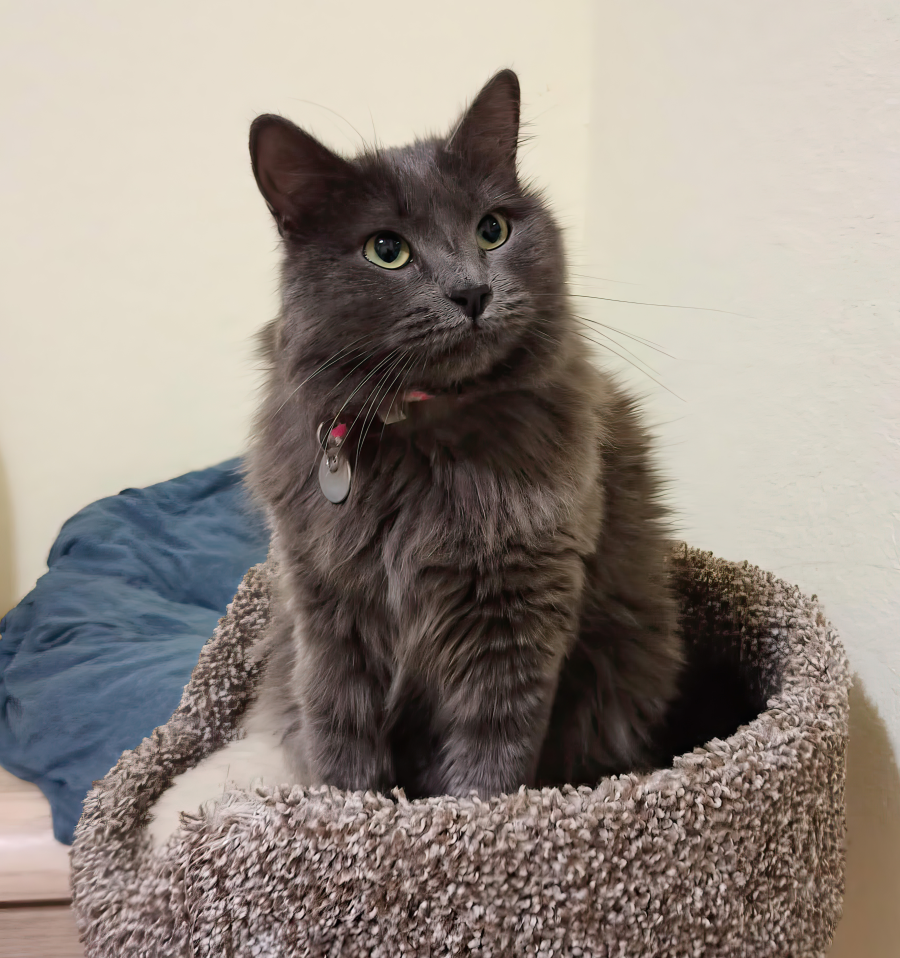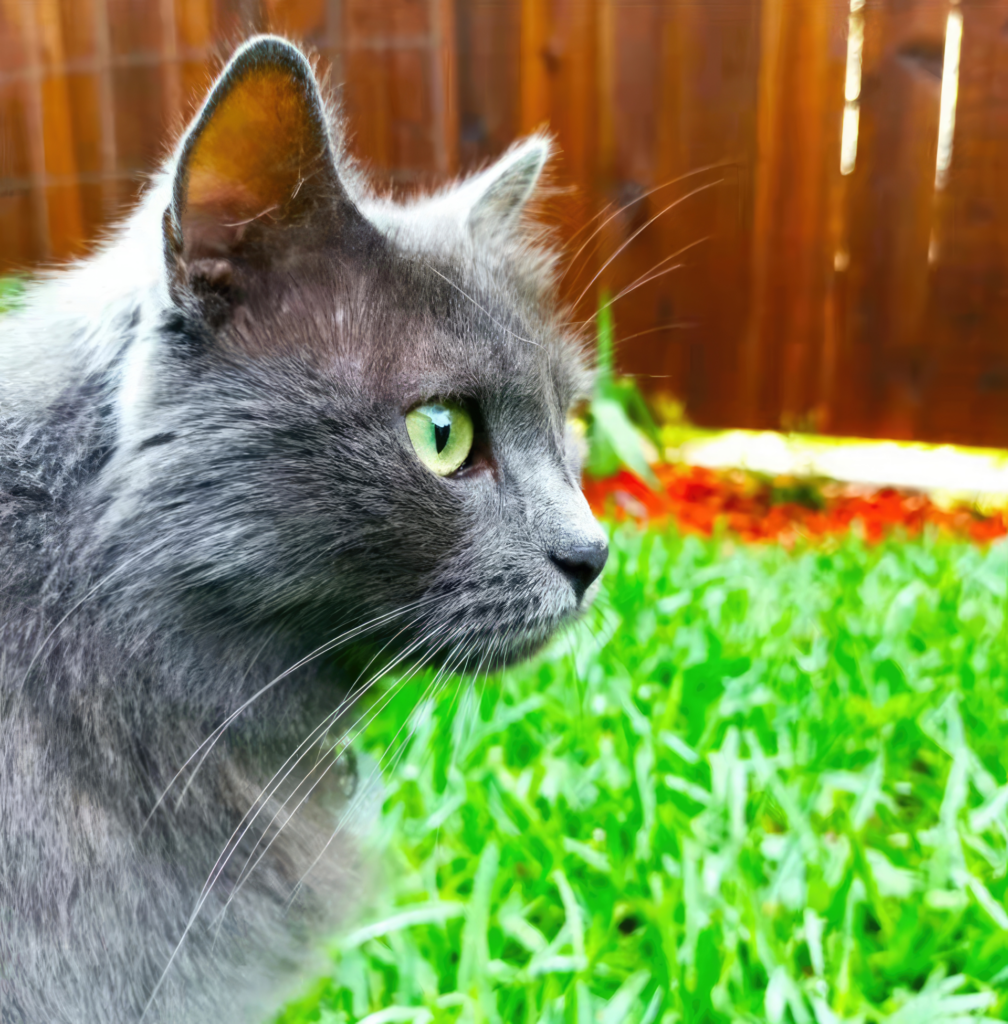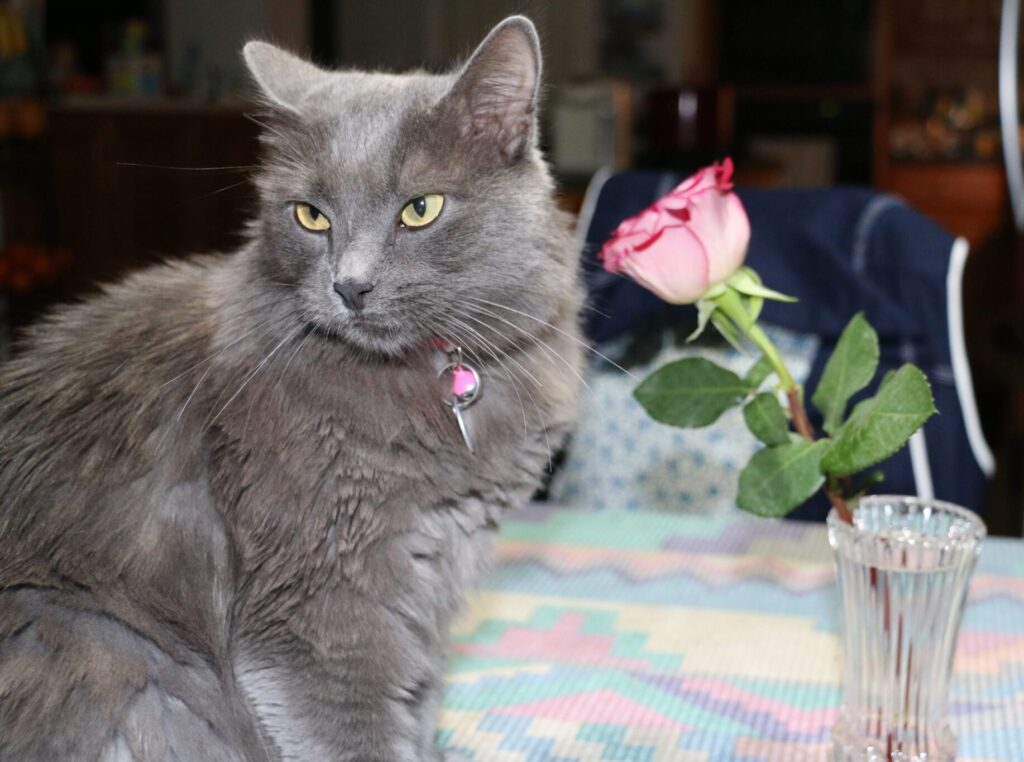Introduction
Tutu is our beloved female Nebelung cat, a cherished family pet who was five years old when she went missing in May 2022. We had her since the fall of 2017, and she was a beloved member of our family for nearly five years. Tutu was a frequent indoor-outdoor cat, known for her beauty, friendly nature, and almost angelic demeanor. She was initially adopted by my brother and his wife, on my mother’s birthday, as an emotional support animal to help her cope with the long battle against leukemia. Tutu brought immense joy and comfort, especially during the COVID lockdowns when the entire family was at home. Despite having other cats, Tutu was special to us, being our first family pet and holding a unique place in our hearts.

We lived on a north-south street, with our house at the northernmost position, and a middle aged man J.C. living in the house directly next to us, and a middle aged woman A.P. living next to J.C. All our houses faced the street on the right side of the line, creating a sequence where J.C.’s house was sandwiched between ours and A.P.’s.
The sudden and mysterious disappearance of Tutu was a traumatic event for our family. Despite extensive efforts, including posting flyers, making announcements on the Nextdoor app, and using Facebook groups, we received no information about her whereabouts. All our neighbors were informed and aware of Tutu’s disappearance.

Weeks went by with no news until suddenly, out of the blue, J.C. approached us with an elaborate story about Tutu, which allegedly A.P had relayed to him. Given J.C.’s private nature, his purported top-secret clearance, and numerous external security cameras around his home, we suspected his motives were not genuine. We believe J.C. was trying to stop our search due to his discomfort with the increased attention and inadvertent exposure caused by our efforts to find Tutu.
A.P., herself a female attorney who works at a divorce law firm, supposedly found a deceased cat matching Tutu’s description and buried it without proper identification or notification. This revelation came three weeks after Tutu’s disappearance. If J.C. and A.P. had genuine intentions, they would have informed us immediately, given our extensive search efforts and the public awareness in the neighborhood.
J.C.’s sudden disclosure and A.P.’s subsequent refusal to provide more information or allow excavation of the burial site raised suspicions of a cover-up. If A.P. had acted reasonably, sharing more details or cooperating in any way, the matter could have been resolved amicably. However, their stonewalling and refusal to answer questions only exacerbated our distress.

Legal Actions
In April 2024, we filed a small claims lawsuit against J.C., seeking compensation for Tutu’s loss. Despite initially being the defendant, J.C., with A.P.’s assistance, chose to file a counterclaim. If he believed there was insufficient evidence to convict him in a civil case for the property loss of Tutu, the case would have concluded without further issue. However, by deciding to file a counterclaim, and using A.P. to help him unethically draft the documents while pretending to represent himself pro se, J.C. created circumstances that allowed Judge Mary Tom Curnutt to repeat violations and misconducts for which she had previously been publicly sanctioned, admonished and warned by the Texas SCJC.
Judge Curnutt’s biased ruling further complicated matters. Immediately after the hearing, J.C. texted my father, boasting about his $16,000 award and inquiring about our financial situation. This harassment continued despite clear instructions for J.C. not to contact my father. J.C.’s actions included seeking immediate payment of the invalid judgment and threatening criminal charges when I filed an appeal, and all based on a fundamentally flawed summary judgment by Judge Mary Curnutt.
During the hearing, Judge Curnutt chastised me, stating that people lose cats all the time and that it was no big deal, adding that she herself had lost many cats. These remarks were unnecessary and inappropriate, especially after making a summary judgment that should never have been made.

Ethical Misconduct
J.C.’s claim to have spent countless hours learning the law to justify his $16,000 demand was fraudulent. He admitted to my father that A.P., his “lawyer friend,” assisted him. This deception was aimed at securing an unjustified financial award, with A.P. benefiting directly by ensuring she was not implicated in further legal disputes. A.P. had a significant conflict of interest, as helping J.C. win against me would likely prevent or weaken any future legal actions I might take against her.
Upon learning of my appeal, J.C. intensified his harassment, issuing a 24-hour ultimatum to drop the appeal or face fabricated criminal charges drafted by A.P. This blatant coercion was an unlawful attempt to deprive me of my right to appeal a corrupt ruling. By involving A.P. in drafting the threats of criminal charges, J.C. not only implicated himself further but also dragged A.P. deeper into the misconduct, giving me a bona fide claim to file with the Texas State Bar.
Additionally, on the day Tutu went missing, our air conditioning broke down, and I had to drive to Kroger twice to get ice. During my first trip around 5 p.m., my car dash cam caught J.C.’s truck parked illegally, almost blocking the road. He was in the back of his truck with a woman who looked like A.P., carrying a crate or box. Later that night, around 10 p.m., I saw two dark blue sedans parked outside A.P.’s home, which were not there earlier. These cars were gone by the next morning, and I have never seen them again since that night, adding to the suspicion.
Furthermore, A.P.’s friend at Arlington Animal Services failed to follow proper procedure by not performing an RFID scan on the deceased cat. Tutu was chipped, and an RFID scan would have provided a positive identification, giving us closure much sooner. Instead, we spent thousands of dollars and countless hours searching for Tutu. The Arlington Animal Services friend’s improper handling and burial of the cat in A.P.’s backyard, contrary to city procedures, compounded the issue.
Given A.P.’s legal background and her friend’s procedural violations, their actions suggest a motive to cover up mistakes. J.C.’s attempts to thwart any legal actions, including threats of false criminal charges, further validate our suspicions. These circumstances imply a potential conspiracy and cover-up, escalating into deeper misconduct as they tried to conceal their initial wrongdoings.

Conclusion
J.C. and A.P.’s actions have caused significant emotional distress to my family and me. The juxtaposition of their behavior—admitting the cat was Tutu, then stonewalling any verification efforts—exemplifies their unethical conduct. A.P.’s refusal to allow excavation to verify the microchip conclusively is part of this distress.
If J.C. claims emotional distress or personal injury, I contend that the distress inflicted upon my family by J.C. and A.P.’s actions far exceeds any alleged by J.C. Their behavior throughout this process has been manipulative, coercive, and unethical, warranting thorough investigation and accountability.
Finally, due to J.C.’s continuous harassment and escalatory behavior, I felt compelled to report him to the FBI, suspecting a color of law violation. Given his top-secret clearance, his actions may pose a national security risk, and the relevant authorities deserve to know.

Update: Sept 2024
New Developments: Waivers of Privacy, Free Speech Rights, and Judicial Overreach:
Since the onset of this tragic case, a disturbing pattern of manipulative behavior and misuse of the legal process has emerged from both A.P. and J.C.. Initially appearing to act independently, they have shown a clear, coordinated effort to obstruct the truth, inflict emotional harm, and retaliate against the Chen family. The Defendants first disclosed details voluntarily, with A.P. revealing to J.C. that she had found and buried a dead cat in her backyard, which J.C. then relayed to the Chen family without any prompting. By willingly sharing this information, they waived any reasonable expectation of privacy. This sequence of disclosures eliminated any shield of privacy they might later attempt to claim when Chen publicly documented the situation on his blog.
Chen’s postings, which detailed his frustrations and reasonable suspicions, are protected under the First Amendment as they were based on factual events and reasonable deductions. His writings did not constitute direct or targeted harassment as defined under Texas Penal Code § 42.07, which requires repeated, direct communication intended to harass or alarm. J.C.’s insistence on construing these entries as harassment distorts both the facts and the legal standards, demonstrating his intent to weaponize the law to silence legitimate public grievances.
The Role of Judge Mary Curnutt: Bias and Abuse of Process:
Adding to the Chen family’s distress is the conduct of Judge Mary Curnutt. Despite being publicly sanctioned earlier in 2024 by the State Commission on Judicial Conduct (SCJC) for using summary judgments improperly and engaging in procedural abuses, Judge Curnutt once again employed summary judgments to dismiss Chen’s legitimate small claims suit against J.C., despite the substantial circumstantial evidence. Worse yet, she simultaneously validated J.C.’s baseless harassment counterclaim—a ruling that contradicts both state harassment statutes and established First Amendment principles.
Judge Curnutt’s pattern of behavior raises serious concerns about her impartiality and adherence to due process. The refusal to allow Chen’s claims to proceed to a jury, when the standard in civil cases is only a “preponderance of the evidence,” shows a clear disregard for Chen’s right to a fair trial. Her subsequent dismissal of Chen’s case with prejudice, while granting J.C.’s retaliatory harassment claim, not only deprives the Chen family of their rightful day in court but suggests a judicial bias that warrants further scrutiny.
Lockheed Martin’s Surveillance System and J.C.’s Mischaracterizations:
An additional layer of complexity arises from J.C.’s reliance on his employer, Lockheed Martin’s undisclosed surveillance system, to support his harassment claim. The situation revolves around Chen’s brief posting of an address on a public forum—an address that was no longer J.C.’s at the time because it had been sold to a third party. Within hours of this post, Lockheed Martin’s system alerted J.C., prompting him to contact Chen’s father in what was a clear attempt to exert pressure. Chen had no way of knowing about this sophisticated monitoring system, nor did he have knowledge of Lockheed’s internal practices. Thus, this type of indirect, second-hand contact cannot be reasonably classified as harassment under Texas law, which requires direct, targeted communication.
The fact that Lockheed Martin had this real-time surveillance in place is not something an average person could have foreseen. Chen’s one-time post, taken down immediately upon request and never repeated, cannot be construed as harassment. J.C.’s attempt to link this isolated incident to an ongoing pattern of harassment falls apart under legal scrutiny, further highlighting the retaliatory nature of his counterclaim.
J.C.’s Extrajudicial Tactics and Retaliation:
When Chen initially filed his small claims suit against J.C. in early May 2024, J.C.’s immediate response was not a formal legal reply but an indirect attempt to pressure Chen through his father. Within an hour of being served, J.C. contacted Chen’s father—who was never a party to the case—and attempted to use him as a conduit to persuade Chen to drop the suit. J.C.’s subsequent email to Chen the very next morning, expressing regret over not pursuing Chen legally back in 2022, reveals a retaliatory mindset. The tone of the email, lamenting that Chen was “coming after him,” underscores the fact that J.C. viewed the small claims case as a personal affront rather than a legitimate pursuit of justice.
The subsequent refusal by both A.P. and J.C. to provide basic information about the dead cat—despite A.P.’s three separate confirmations that it was indeed Tutu—further points to a coordinated strategy to avoid liability. Even when given opportunities to recant or clarify, A.P. chose instead to double down on her assertions, all while withholding crucial details such as the exact date and circumstances of the burial, or the involvement of Arlington Animal Services. This calculated behavior, coupled with the complete stonewalling that followed, amounted to psychological torment for the Chen family, who were left in a state of perpetual uncertainty and distress.
A Pattern of Collusion and Evasion:
The Defendants’ synchronized responses, shifting narratives, and retaliatory legal tactics suggest a deeper, more disturbing pattern of collusion. Given J.C.’s top-secret clearance and A.P.’s standing as a licensed attorney in Texas, both parties were fully aware that their actions were not just unethical but potentially unlawful. Their refusal to allow for the basic verification of facts—such as an RFID scan to confirm the cat’s identity—demonstrates an intent to keep the Chen family in the dark, compounding their emotional suffering.
A.P.’s role in guiding J.C.’s legal responses, drafting motions, and inflating his damages claim to a ludicrous $16,000 underscores their intertwined conduct. The fact that J.C. admitted in court that his filings were essentially “copy-paste” versions of Chen’s previous claims against A.P. shatters any illusion of independence between the two. Their coordinated efforts were designed to create confusion, intimidate Chen into dropping his claims, and manipulate the legal system to serve their own ends.
Conclusion: A Continued Fight for Justice and Accountability:
The Chen family remains steadfast in their pursuit of justice. Despite the setbacks and psychological torment, they will not be silenced. The overwhelming circumstantial evidence, the inconsistencies in the Defendants’ accounts, and their suspicious behavior—all these elements exceed the “preponderance of the evidence” threshold required in civil cases.
This is more than just a family’s search for a missing pet. It is about ensuring that the legal system is not misused to intimidate those seeking justice and holding accountable those who would weaponize silence and the law to inflict harm. Justice for Tutu demands no less.
